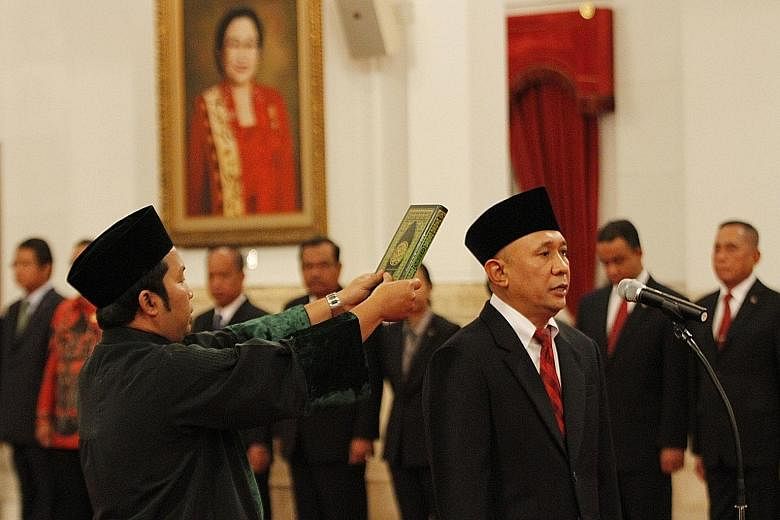President Joko Widodo promoted his trusted aide as his Chief of Staff and added a small party to his ruling coalition in moves that could strengthen his position as he seeks to carry out his reform promises.
Former anti-graft activist Teten Masduki, who has been tirelessly supporting Mr Joko since the presidential campaign, was made Chief of Staff, taking over from Mr Luhut Pandjaitan, another of Mr Joko's allies, who last month took over a key role as the coordinating minister for security and political affairs.
Also yesterday, the National Mandate Party (PAN) declared its support for Mr Joko's Indonesian Democratic Party-Struggle (PDI-P), bringing the ruling coalition's control of parliamentary seats to 46 per cent from 37 per cent previously.
PAN's move helps the ruling coalition inch closer to a majority; it needs only to find another small party to join it to outnumber the seats controlled by the opposition. Indonesia has 10 political parties, three large and seven small parties.
"During hard times as the economy slows, we have to put the nation's interest above group interests. There should not be divisions," PAN chairman Zulkifli Hasan, who is also chairman of the upper house, told a media briefing at the presidential palace.
Mr Ali Munhanif, political analyst at state Islamic university Syarif Hidayatullah, told The Straits Times that PAN has skilful MPs who can make Mr Joko's job easier in getting his reforms through.
At the same briefing, Mr Joko said: "I greatly appreciate PAN's decision to join the government. I would like to ask all parties to use this momentum to strengthen the spirit of nationhood and unity."
The changes yesterday, happening hours apart, came as Mr Joko is attempting to consolidate his grip on government in order to steer Indonesia out of slowed growth.
He needs Parliament's support to speed up government spending on infrastructure projects and cut or amend more than 150 regulations that hamper business activity.
The appointment of Mr Teten yesterday came after a Cabinet reshuffle last month in which Mr Joko had tried to strike a balance between keeping his reform agenda and allowing party seniors to influence his decisions.
In January, the president had been pressured into nominating Mr Budi Gunawan, who is close to PDI-P seniors, as police chief. He was later dropped after being named a suspect in a corruption investigation.
Mr Teten's appointment as chief of staff was Mr Joko treading the middle ground again, said observers. It was meant to diffuse tensions that have been growing since early this year at the presidential palace, particularly between Mr Luhut's office and Vice-President Jusuf Kalla.
Mr Kalla, although not from PDI-P, has a warm relationship with PDI-P chairman Megawati Sukarnoputri which means he has the support of the party's seniors.
On the other hand, Mr Luhut, who is also not from the ruling party, has caused resentment among the PDI-P elites because of his close access to the president.
Last month, Mr Kalla said the chief of staff post will be taken by PDI-P politician Pramono Anung, who was made Cabinet secretary in the reshuffle. Mr Pramono is a party veteran trusted by Ms Megawati.
Mr Kalla's statement was quickly dismissed by Mr Luhut's aide Mr Atmadji Sumarkidjo, who said his boss had been given a dual role, that of coordinating minister and chief of staff, at least for some time.
Now, Mr Joko has replaced Mr Luhut, despite his being a skilled go-between for the president and the opposition factions in Parliament, in a bid to appease his deputy and the seniors in his party, as he had done so through the reshuffle.
Dr Dodi Ambardi, a political analyst at the Gadjah Mada University, gave The Straits Times his observation of the reshuffle: "Before the Cabinet reshuffle, PDI-P elites were very critical of the government that they made themselves look like an opposition. They felt they were marginalised."

